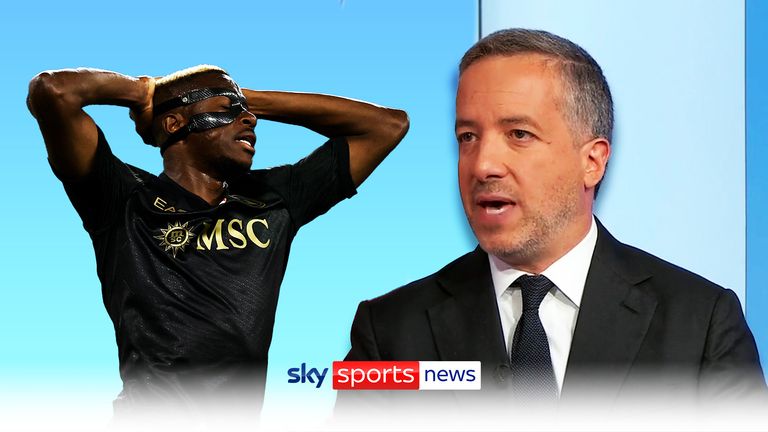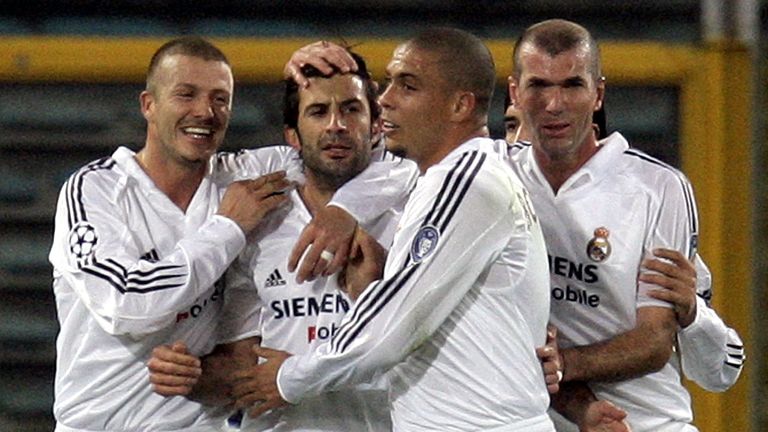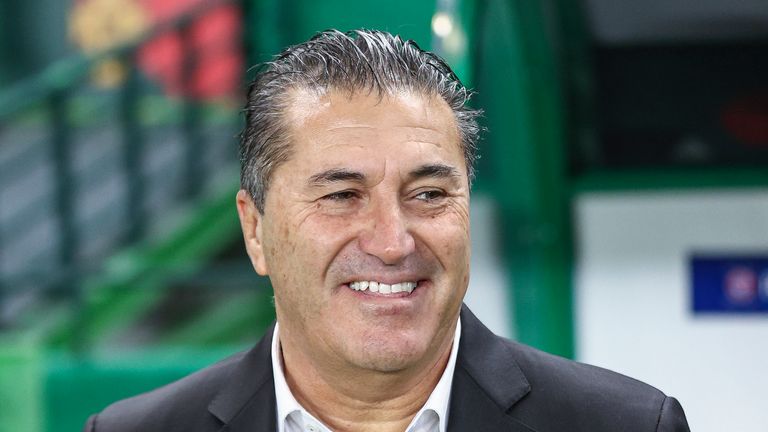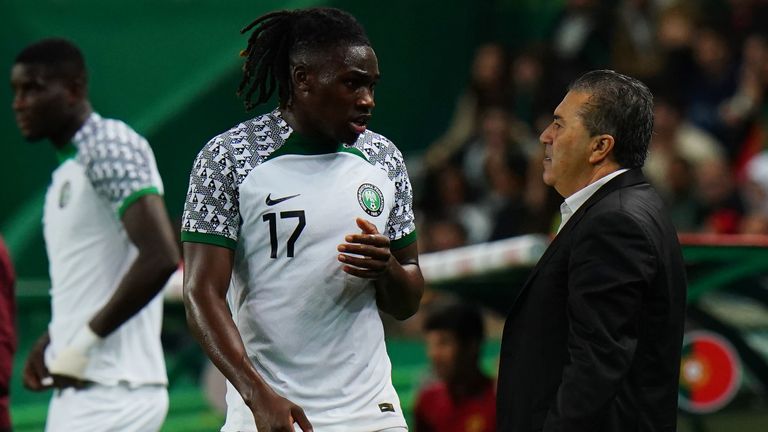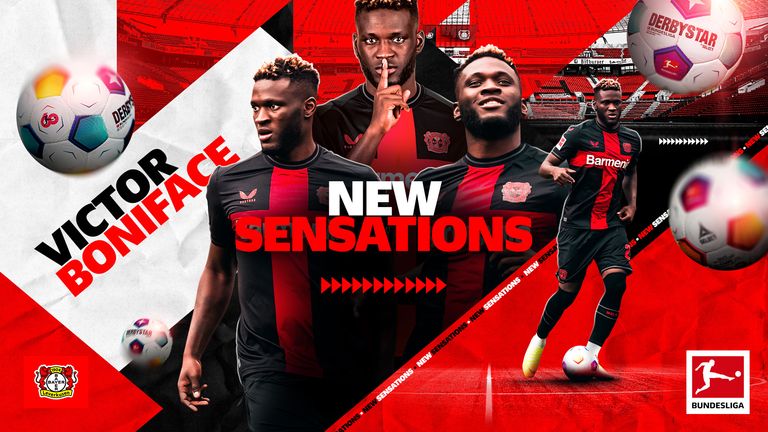Victor Osimhen: Napoli videos ‘cannot happen’, says Nigeria coach Jose Peseiro as he defends striker and looks to AFCON
“This video? From the club? From the outside is one thing but a video from the club is the worst. It can’t happen,” Jose Peseiro told Sky Sports. “He was sad because it’s not easy for anyone. He doesn’t understand. He doesn’t understand why.”
Nigeria’s head coach knew there would be challenges when he took charge of a football-obsessed country of over 200 million people, but he didn’t expect not having to deal with the consequences, as their star player, Naples’ Victor Osimhen, was inexplicably injured. targeted by his own club.
Perhaps you’ll have seen the bizarre social media post mocking Osimhen’s missed penalty or the racist one calling him a coconut. The man who helped Napoli win their first Serie A title since the days of Diego Maradona, reduced to a punchline.
Peseiro traveled to Naples and saw the other side, the public displays of adoration for Osimhen in a city that has long been a shrine to the cult of Maradona. There are now murals of the current center forward alongside the former icon. “At the same location.”
This is another reason why he is outraged by recent events. “He’s helping the team in the league and now they’re making fun of him?” But after speaking to Osimhen to offer his support, his advice is to stay focused and not let this treatment affect his ambitions in the game.
“Osimhen is a star. Two years ago he wasn’t a star. Now he’s a star. And when you’re a star, everyone wants more, more, more. Others can do bad but if Osimhen does bad it’s different because people demand more from players who can do more.
“It was a bad thing that Napoli did. Of course he would prefer that they didn’t do it. But my advice is to stay calm. Don’t play against the fans. Don’t lose your balance. Keep the mentality . Keep the personality. That’s what the best players do. And he can be at the top.”
Peseiro, 63, knows how to work with the best. A former second division striker in his native Portugal – ‘I didn’t play at a high level’ – his coaching career took a turn after promotion to the top flight with Nacional. A job offer put him on a different trajectory.
“I called José Mourinho”
“I was in Brazil recruiting players when my old teacher Carlos Queiroz called me. He told me he was going to Real Madrid and wanted me as an assistant.” It was 2003, the summer that David Beckham joined the tinsel band known as Galacticos.
“I didn’t decide straight away, I called José Mourinho because he was my friend. Remember he had been an assistant at Barcelona. I asked him what he thought because I “I was already a head coach. He told me: ‘Go for it. Because we can learn a lot of things there.’
As a result, Peseiro took sessions with Raul, Roberto Carlos and Ronaldo, with Zinedine Zidane and Luis Figo. “Until then I was scared. Never before had I shared a dressing room with great players. But it wasn’t difficult because they are so intelligent. It was fantastic.”
The experience only lasted one season. “We had 11 good players and then the rest.” The experiment of mixing superstars with potential academy candidates – and selling the little-known Claude Makelele – became an example of why great teams beat great individuals.
Peseiro parlayed that knowledge into a varied career that saw him lead Sporting to the UEFA Cup final in 2005 before working in Greece and Romania. He was manager at Porto and head coach of the Venezuelan national team. “You have to adapt,” he says.
“The Ajax team of the 70s is still my main reference, their mobility in attack, their ball control. From there I created my model. But the game has changed a lot. Arrigo Sacchi reduced the field 40 or 50 meters away and this reduced the space.
“The challenge is to find that space for players to show their skills, that’s what people want to see. But the modern game is a game of transition. That’s what decides the best teams because it’s more easy to form an offensive and defensive organization. as transitions.
Peseiro is engaging company, with a master’s degree in sports science and memories of a career spent traveling the world, but major silverware has eluded him. This, he thinks, is a great opportunity. His Nigeria team will play in the African Cup of Nations in January.
“The main objective is to win the CAN,” he said. “We will have to give the maximum because we know that there is good opposition. There is Senegal, Tunisia, Morocco, Egypt, Ghana and Ivory Coast. But we believe that we can do. I believe it. And the players believe it.”
There are challenges. “The structure and organization are not like in Europe.” Peseiro accepted a reduction in his salary so he could stay for a tournament originally scheduled for this summer. “The players pushed me to stay because they believe we can win.”
He is trying to build something, but was forced to select a number of national players for friendlies against Mexico and Ecuador last year, a frustration as he tries to foster a sense of unity. Not easy when players from all over the world come together.
“I tried to explain that if you don’t come to the friendlies, we can’t improve. You will never create that connection, not just on the pitch but off it, because the spirit is important. If you you meet more often, you can create that spirit you need.
Osimhen joined the team in this international window and is leading by example. But he is not alone. Nigeria’s depth is a point of difference from other African nations. “It’s not easy for me to choose the attackers or the wingers,” laughs Peseiro.
Nottingham Forest’s Taiwo Awoniyi and Leicester City’s Kelechi Iheanacho are in the squad. From Serie A, there is Samuel Chukwueza from Milan and Ademola Lookman from Atalanta. Victor Boniface is the top scorer for Bundesliga leaders Bayer Leverkusen.
But it’s clear who the star is.
“When Osimhen goes to Nigeria, everyone wants to touch him, talk to him or take a photo with him,” says Peseiro. “And not just in Nigeria. Everywhere.” During CAN qualifying, they scored 10 goals, twice as many as any other country.
“The only reason he didn’t score more was because he allowed his teammates to take two penalties. My advice would be to take them! The other players wouldn’t allow it, but if anyone one asks him to let them take a penalty, he allows it. He’s a good guy.
“He’s a strong guy, a smart guy and an incredible player, defensively and offensively. He can do everything. He puts pressure on the central defenders, he puts pressure on the line running behind. He can attack the ball in the in the air and on the ground. He is motivated, fast and strong.”
This is why Nigeria dreams of this first success in CAN for more than a decade. “We can win it,” adds Peseiro. “The players know it. They come with the same energy, the same conviction, to fight for the Super Eagles.” With Victor Osimhen around, anything is possible.
And there’s no chance his national team manager will forget him.

